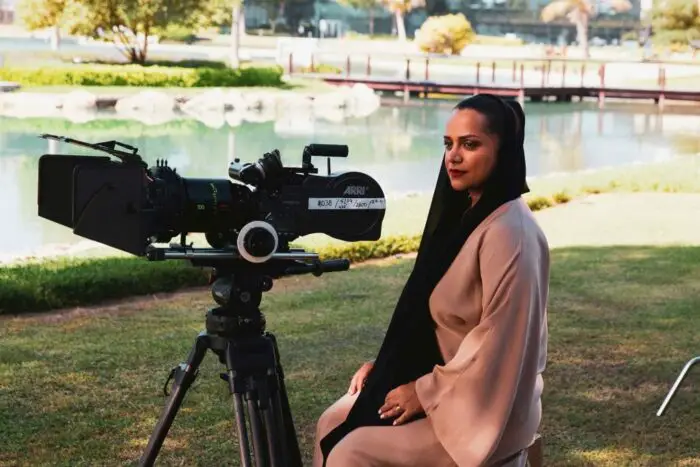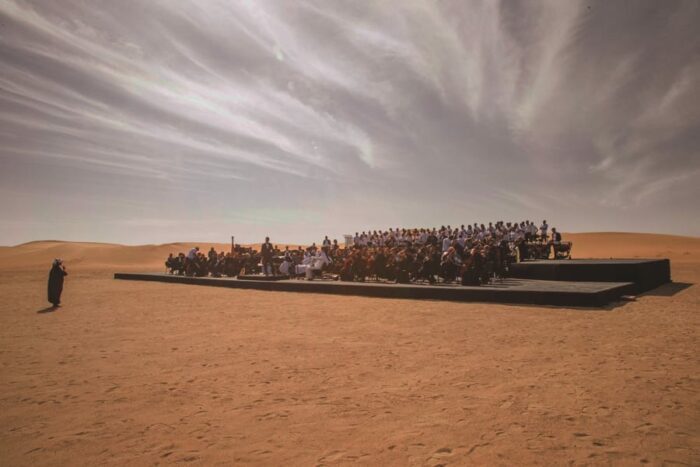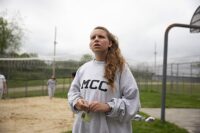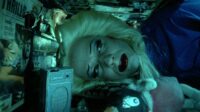Nayla Al Khaja is a trailblazer in every sense of the word. She is the first female film director and producer in the United Arab Emirates and is CEO of her own production company, Nayla Al Khaja Films. Her journey took her from Dubai to Toronto—where she attended Ryerson film school—and back home to Dubai where she began making shorts. In 2006 she was awarded the title of Best Emirati Filmmaker during the Dubai International Film Festival (DIFF) and since then the accolades have not stopped.
In recent years, she has been ranked among the top 50 most powerful personalities in Arab cinema and the 100 most powerful Arabs under 40 by Arabian Business Magazine. She’s also been awarded the Visionary of the Year Award at the Arabian Business Awards, and she is Brand Ambassador for Canon Middle East since 2011. She was recently declared Entrepreneur of the Year during the Gulf Business Awards 2017.
Nayla’s unique and arresting visual style has attracted many major international brands to her and the commercials she produced for companies such as Mercedes, Nike, Nestlé, Neutrogena and Nivea, have been praised by the CEOs personally. Her other high-profile clients include legendary photographer Annie Leibovitz and tennis player Roger Federer. She was also appointed by the Dubai Government as the behind-the-scenes Director on the 2016 mega-budget film Star Trek Beyond.
Her upcoming projects include the Netflix anthology series The Alexandria Killings with Oscar-winning director Terry George (Hotel Rwanda) attached as show-runner. Al Khaja will serve as the show’s executive producer and will direct a few episodes. She is also working on a children’s action fantasy in the spirit of 80s Spielberg. In the midst of a busy year, Al Khaja spoke to us about her career and drive.
Jason: I understand your love for cinema started at an early age? Can you expand on that and what were the first films that you remember having an effect on you?
Nayla Al Khaja: Film was a roadmap for my previous passion, which is fine arts. I had a little gallery here in Dubai before I got into film. I thought I’d be a full-time painter. But somehow I fell into film by accident. I was always obsessed with watching VHS tapes back to back as a child, but I could only watch a certain type of genre. I remember watching The Exorcist when I was seven or eight, which scarred me. I wasn’t supposed to catch that. I stumbled into film very early on. When I went to school, I was experimenting with 8-millimetre and I made my first documentary at the age of nineteen. I immediately fell in love with making film. The process of filmmaking is something that spoke to me so easily because I thrive on chaos. I thrive on madness, I thrive on unpredictability, and filmmaking had all these components. You hope and cross your fingers that you’re going to create something beautiful that can defy time and space and place. I fell in love with the magic of filmmaking and took it seriously from that point onwards.
Jason: Did you feel it was a way to communicate your ideas to others for images and storytelling? Like you just mentioned, when you’re actually on a set there are a million things which come up each day and communication is the key. Is that something that you also thrive on?
Nayla Al Khaja: I learned very early on to delegate, which is one of the amazing skill sets that I gained when I started my production house as an entrepreneur. You can’t do everything yourself, you need to let go of control and hire people that can do things. It’s okay that they are doing what they’re doing as long as you can communicate what you want them to do and that they are performing in a way that speaks to your vision. With film, it’s overwhelming as it is because you have so much on your shoulder as a film director to deliver. Sometimes we’re talking about big-budget films, so that pressure alone can be difficult.
Jason: You’ve worked in both fiction and true stories? Is there one you prefer?
Nayla Al Khaja: If I get a story that’s riveting and outside what I’m accustomed to, I would take on the challenge of directing it. Something happened during the pandemic where I was offered the opportunity to direct something that was off my radar, but I couldn’t keep the script down. It was marvelously written, so I jumped on that opportunity. We’re scheduled to shoot at the end of this year. It’s a children’s adventure film.
Jason: You’ve been recognized by many publications as one of the most powerful United Arab Emirates individuals working today. What does that mean to you?
Nayla Al Khaja: I feel like I’m making my mark with my miniseries The Alexandria Killings, which is material that I wrote and then presented to Rocket Science and Front Row Filmed Entertainment, They got Terry George, the Oscar winner from Hotel Rwanda and In the Name of the Father to attach himself as the show-runner. I am now on that series as an executive producer, and I might also direct an episode or two. That’s the first glass ceiling I could shatter. I think I’m the only filmmaker who has done that in my country regardless of gender.
Jason: Do you feel you’ve become more powerful in using your voice since you began?
Nayla Al Khaja: Absolutely. It’s been almost two decades now, and I’m more poised and calmer. And that’s a good thing. My voice is stronger in the sense that I know what I want and I have very little patience for things I do not want or people I don’t want to be around. When I was younger, it was more hit and miss and I made impulsive decisions. I have matured skill-wise, understanding the entire world of cinema and how it functions. If I’m going to pitch for big-budget films, I need to understand a way how to mitigate the risk for my investors. So I operate more than a producer, and once that part is over I wear my director’s cap.

Jason: These days, more people are aware of equality and diversity in film, and it is beginning to become more of the expected norm, but that wasn’t always the case. I’m sure it wasn’t when you started. What have you observed over the past 20 years in terms of shifting attitudes in this area?
Nayla Al Khaja: I was speaking about Chloé Zhao, who won the Oscar for Best Director for Nomadland, about how she’s only one of two women to have ever won in the 93-year history of the Academy Awards. That gender gap is crazy. It needs to change. In the US alone, women directors with top US domestic films make up 8%. That’s 1% less than it was in 1998, which is ridiculous. In Hollywood alone, with the top 100 films, only 4% are allocated to females. But, in the Middle East, we are ahead of the US. We’re at 5% for women directors. In Lebanon and Palestine, it’s 50%. In Europe, it’s 12%. So it’s pretty bad in North America, and then Europe is a little better. Right here in the U.A.E., I’m one of six female filmmakers against 38 or 39. It’s still not wonderful, but it’s not as bad as it is in the US. But there’s a shift in the world with the #MeToo movement and #TimesUp. I think that helped in getting people talking. In China last year, three of the top-10 grossing films were by women. If you look at the root of the problem, you understand that all the decision-makers, 99% of them are 40 plus year old, white Caucasian men green lighting these projects. So that needs to shift—the person controlling the pen, so to speak. If more female investors come on board as producers or investors, then you will see a shift in the way things are done.
Jason: To come back to how you began, I’m interviewing you from Newfoundland, Canada. I understand your time arriving here in Canada was pretty daunting at first. What was something which surprised you the most when you first arrived?
Nayla Al Khaja: I’m going to tell you something silly. When I arrived in Canada, it was the coldest winter they had in 19 years. I just went from one deep end to the other because it was 50 degrees here and in Canada was -19 with wind chill, which I couldn’t get my head around—or my frozen toes. I struggled to settle, and it took me a year and a half, but then I just fell in love with Canada and everything it offers. It was difficult because the U.A.E. is a tiny place. It’s more intimate, and Toronto is bustling with life. I remember getting a $2,000 crappy car and I was going to fill my car up with gas and I realized that no one’s going to do that. That concept alone was shocking to me because in Dubai someone comes and pumps it for you. But this was the first time I did it for myself. But the bigger picture was that these types of incidents built me and gave me a different perspective, including the perspective of interacting with different religions. I developed friendships with many religions and cultures in Toronto, and I think that was an amazing experience to have as a young Arab woman. That city gave me so much and had a lot of eclectic art, a lot of alternative cinema, and access to the arts.
Jason: What was different for you when you returned to Dubai?
Nayla Al Khaja: In Toronto, I was like a little fish in this massive ocean. Whereas here, I could be a whale in an aquarium, so to speak. I have a better chance to leave my mark and impact younger women and men—or as I call them young adults—and it has always been one of my primary goals is to inspire the inspire young Arabs in this region. It makes more sense that I connect with my people and try to do something more authentic here. It was very difficult, but I’m glad I came back.
Jason: You created your production company shortly after graduating yet before the age of social media?
Nayla Al Khaja: Funny enough, I suck at social media. I was in a couple of big articles in magazines and I was creating a splash here for myself, and that garnered more clients. It translated into money. Back in the old days, I had so much energy and I would have lots of clients and win accounts. It was a wonderful space and time to be in. We call it the golden years. But of course, the world financial crisis hit in 2008 just killed everything. And then social media started, and I felt super left out. I still feel super left out. I don’t know how to maneuver through that game of social media. It doesn’t come to me. I don’t enjoy posting. I’d rather live in the actual world.
Jason: That’s not uncommon with artists. A number who I’ve interviewed feel what they create should speak for itself. So your films began receiving acclaim and awards after a few short years. What was that feeling like?
Nayla Al Khaja: It gave me a boost of confidence that I was on the right path, that I was creating beautiful films that I could leave behind when I’m gone. The idea is to create films that can inspire and move hearts and minds. And I could do that with a few shorts. They got great feedback, and some of them got into festivals and won awards. It’s a great boost of confidence.
Jason: How important is mentoring to you?
Nayla Al Khaja: Mentoring and volunteering are important. With mentoring, I always tell my senior heavyweight producers who are working with top Hollywood actors, like guys please, all you have to do is just ask me to come on set. I’ll pay for my ticket; all I want to do is to sit and watch directors work. I find it fascinating to see how every artist treats a story in their own way. There’s so much learning to be done through that. For me, that is mentorship, but then I’ve also passed it along the way. Throughout all these years, I’ve mentored a lot of young boys and girls in the industry here. It’s very fulfilling.
Jason: When it comes to showcasing your heritage, do you have people come up to you and say ‘I’ve never seen myself represented in film and TV until now’?
Nayla Al Khaja: It happened last year when I directed a film in my country. It was my strongest corporate work, but it had a lot of heart and emotion in it. The coolest thing that happened is people from here texted me saying there were some scenes they would have never thought would ever get captured on film if they hadn’t seen that. So it moved them.

Jason: What would you say to big studio decision makers to convince them about bringing their projects to Dubai? It would create some striking film moments. I know Mission Impossible: Ghost Protocol showcased Dubai in an amazing way with Tom Cruise famously scaling the Burj Khalifa (a 2,722- foot Dubai skyscraper).
Nayla Al Khaja: I worked on Star Trek Beyond behind the scenes which was fun because that gave me access to how the film was shot and the gigantic sets they had including the wardrobe room. So your question to me is more directed to the Film Commission here and what they can do to attract American dollars or international money. Because the city has a lot to give, it’s flexible in terms of weather, so it’s warm all year long. We have stunning mountains and beautiful oceans, we have the cities of Dubai and Abu Dhabi with the Metropolitan skyscrapers and so on. The locale and the look and feel is something you can get a lot out of. I know we have one of the highest incentives and film, which is a direct 30% cash back on everything shot in the country.
Jason: You have a huge number of upcoming projects, we touched on one early earlier—the Netflix project with Terry George set in Alexandria in 1920—and you have two major film projects coming up. What can you tell us about those?
Nayla Al Khaja: I can say Magic Carpet – The Search for Now is the adventure children’s that I mentioned earlier. I can’t say who’s attached right now as we’re actually in the middle of casting. All I can say is its super exciting. It’s Goonies meets Indiana Jones. It has lots of adventure and goofiness to it, lots of fun and heart and soul. I had my twins just before COVID, and I think it’d be nice to have something that kind of speaks to their age.
Jason: Are you working on a horror project as well?
Nayla Al Khaja: The second one is my horror film. It is based on a true story from my own family which took place in the 90s in the U.A.E. and I’ve turned it into a screenplay that now has a few producers. I have a producer from L.A. who worked for Pedro Almodóvar as an agent. We have Middle East and North Africa distribution signed up already. That looks like it might be my first feature film. It’s called Three. They’ll be filmed this year and released the first quarter of next year, fingers crossed.
Jason: Is there anything else you’d like to touch upon?
Nayla Al Khaja: I’m just one of the lucky ones where although there are parts of my career that I hate, I would say I love 90% of it, which is a great percentage. It’s fulfilling for me to wake up every day and do what I love doing best, which is telling stories. So I’m very blessed that way.
For more information on Nayla Al Khaja and her work visit www.naylaalkhaja.com
Follow Nayla Al Khaja on Instagram www.instagram.com/naylaalkhaja/


